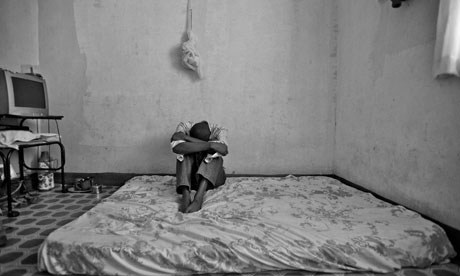 |
| "Boys throw stones at Israeli soldiers." (AFP) |
By Catrina Stewart
The Independent, 26 August 2011
"The boy, small and frail, is struggling to stay awake. His head lolls to the side, at one point slumping on to his chest. 'Lift up your head! Lift it up!' shouts one of his interrogators, slapping him. But the boy by now is past caring, for he has been awake for at least 12 hours since he was separated at gunpoint from his parents at two that morning. 'I wish you'd let me go,' the boy whimpers, 'just so I can get some sleep.' During the nearly six-hour video, 14-year-old Palestinian Islam Tamimi, exhausted and scared, is steadily broken to the point where he starts to incriminate men from his village and weave fantastic tales that he believes his tormentors want to hear. This rarely seen footage seen by The Independent offers a glimpse into an Israeli interrogation, almost a rite of passage that hundreds of Palestinian children accused of throwing stones undergo every year. Israel has robustly defended its record, arguing that the treatment of minors has vastly improved with the creation of a military juvenile court two years ago. But the children who have faced the rough justice of the occupation tell a very different story. 'The problems start long before the child is brought to court, it starts with their arrest,' says Naomi Lalo, an activist with No Legal Frontiers, an Israeli group that monitors the military courts. It is during their interrogation where their 'fate is doomed', she says. Sameer Shilu, 12, was asleep when the soldiers smashed in the front door of his house one night. He and his older brother emerged bleary-eyed from their bedroom to find six masked soldiers in their living room. Checking the boy's name on his father's identity card, the officer looked 'shocked' when he saw he had to arrest a boy, says Sameer's father, Saher. 'I said, "He's too young; why do you want him?" "I don't know," he said'. Blindfolded, and his hands tied painfully behind his back with plastic cords, Sameer was bundled into a Jeep, his father calling out to him not to be 'We cried, all of us,' his father says. 'I know my sons; they don't throw stones.'
